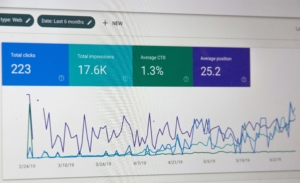If you’re a therapist looking to grow your practice, you know how important it is to reach potential clients. While traditional marketing methods still have their place, online marketing has become essential in today’s world. That’s where SEO, or Search Engine Optimization, comes in.
As a therapist-owned SEO business, we get it—your time is precious, and your focus is on helping people. In this guide, we’ll break down SEO strategies specifically for therapists, showing you how to enhance your online presence and connect with the clients who need your therapy services. Let’s explore practical, effective ways to make sure your practice stands out online.
SEO might sound intimidating, but it doesn’t have to be. Think of it as a way to make your valuable services more visible to those who are searching for them. From optimizing your website content to targeting specific keywords that your potential clients are searching for, we’ll cover everything you need to know to get started. Whether you’re new to online marketing or looking for a new strategy, this guide will provide actionable steps to boost your practice’s online visibility. Let’s dive in and make SEO work for you, so you can continue doing what you do best—helping others.

What is SEO for Therapists?
SEO, or Search Engine Optimization, is all about making your website more visible to people who are searching for therapy services online. For therapists, this means optimizing your website so that when someone searches for terms like “anxiety therapist near me” or “trauma counseling,” your site shows up higher in the search results.
Why does this matter? Because most potential clients won’t look past the first page of search results. By optimizing your site for search engines, you increase the chances that these potential clients will find you instead of someone else. SEO involves using the right keywords, creating high-quality content, and ensuring your site is user-friendly and loads quickly.
Think of SEO as your digital calling card. It helps Google understand what your practice is about and directs people to you when they need your help. In essence, SEO for therapists is about making sure that when someone is looking for mental health support, your practice stands out in the crowded online space. This way, you can connect with more people who need your services and grow your practice effectively.
Local SEO
Local SEO is a crucial aspect of SEO for therapists. It focuses on optimizing your online presence to attract more clients from relevant local searches. This is particularly important for therapists because many people prefer to find mental health professionals within their vicinity.
To boost your local SEO, you can optimize your Google My Business (GMB) listing. Ensure all your information is accurate and up-to-date, including your address, phone number, and business hours.
Another key element of local SEO is using location-specific keywords. Incorporate terms like “anxiety therapist in [Your City]” or “trauma counseling near [Your Area]” into your website content and meta descriptions. This helps search engines connect your practice with users searching for services in your area.
Is SEO Worth It for Therapists?
Investing in SEO can be incredibly beneficial for therapists. With more people turning to the internet to find mental health services, having a strong online presence is essential. SEO makes it easier for potential clients to find your practice.

One of the primary benefits of SEO is that it targets users who are actively searching for your services. Unlike traditional marketing methods, which cast a wide net, SEO attracts potential clients who are already looking for help. This means they are more likely to book an appointment. Moreover, SEO offers long-term results. While it requires an upfront investment of time and resources, the benefits compound over time, leading to sustained traffic and client inquiries.
SEO also builds credibility and trust. When your website appears at the top of search results, it signals to potential clients that your practice is reputable and authoritative. This is particularly important in the field of mental health, where trust and professionalism are key. So, is SEO worth it for therapists? Definitely! SEO is a worthwhile investment for therapists looking to grow their practice, reach more clients, and establish a strong online presence.
How to Practice SEO?
Practicing SEO involves several key steps that help improve your website’s visibility and attract more potential clients. While it’s entirely possible to handle SEO on your own, the process can be time-consuming and requires ongoing effort.
Keyword Research
Keyword research is the foundation of any successful SEO strategy. Start by identifying the terms your target audience is searching for. These keywords should be relevant to your therapy practice and the services you offer. Incorporate these keywords naturally into your website content, including blog posts, service pages, and meta descriptions.
On-Page SEO
On-page SEO involves optimizing various elements of your website to improve its search engine rankings. This includes your content, meta descriptions, titles, and headers. Ensure that each page is user-friendly, easy to navigate, and mobile-optimized. Use your target keywords strategically without overstuffing them. Proper on-page SEO helps search engines understand what your website is about and how it should be ranked.
Content Creation
Regularly updating your blog with relevant, high-quality posts is crucial. Write about topics that address the needs and concerns of your clients, such as coping strategies for anxiety, benefits of therapy, or how to find the right therapist. Consistent content creation keeps your site fresh and engaging, which not only attracts more visitors but also signals to search engines that your site is active and relevant.
Link Building
Building both internal and external links is essential for SEO. Internal links help Google understand the structure of your site and how your pages are related. External links, or backlinks, from reputable sources, boost your site’s authority and credibility. Engage in guest blogging, collaborate with other professionals, and seek out opportunities to get your content linked on other websites to enhance your link-building efforts.
Technical SEO
Technical SEO focuses on the backend aspects of your website that affect its performance and visibility. Improve your site’s loading speed, fix broken links, and ensure that your website is easily crawlable by search engines. Tools like Google Search Console can help you identify and resolve technical issues. A well-optimized site not only ranks better but also provides a better user experience.

Which Keywords are Best to Target in SEO?
Choosing the right keywords is crucial for effective SEO, especially in a competitive field like therapy. For therapists, the best keywords are those that potential clients are likely to use when searching for mental health services. Start by thinking about the services you offer and the issues you help clients with. Keywords like “anxiety therapy,” “depression counseling,” “trauma therapist,” and “couples therapy” are good starting points.
In addition to these core terms, consider local keywords. Most clients will be searching for services in their area, so including your location in keywords can boost your local SEO. For example, “anxiety therapy in New York City” or “couples counseling in Los Angeles” can make a big difference in attracting local clients. Tools like SEMrush can help you identify popular keywords in your area and niche.
Don’t forget about long-tail keywords, which are longer and more specific phrases. These might have lower search volumes but often attract clients who are closer to making a decision. For instance, “affordable trauma therapy in Chicago” or “best therapist for anxiety near me” can be highly effective. Targeting a mix of broad and specific keywords, which form part of your digital marketing strategy, will help you reach a wider audience and connect with clients who are searching for exactly what you offer.
Start Reaching Your Ideal Clients Online Today!
Ready to take your therapy practice to the next level with SEO? Let Simplified SEO Consulting be your guide. Whether you’re looking to boost your online visibility, attract more clients, or improve your search engine rankings, our team is here to help. Schedule a free consultation today and discover how our tailored SEO solutions can transform your practice. Don’t miss out on the opportunity to reach more potential clients and grow your business.
- Contact us now!
- Learn how you can do SEO by yourself here.
- Reach more ideal clients and elevate your therapy website.
Other Services We Offer:
We understand that each private practice has its own unique specialties. That’s why we provide a variety of SEO services! We cater to therapists, counselors, psychiatrists, and other professionals in the helping field. Alongside our DIY courses, we offer Done-For-You SEO packages, a 12-week intensive 1:1 SEO training program, and a Content Network service!
About The Author
Olivia Ferguson graduated from Central Michigan University with a bachelor’s degree in social work. With a prior history in crime victim advocacy, this brought her great knowledge of the legal justice system and the mental health profession. Connecting those tools together, her goal is to help therapists reach their ideal clients by improving their online presence and rankings with SEO.















